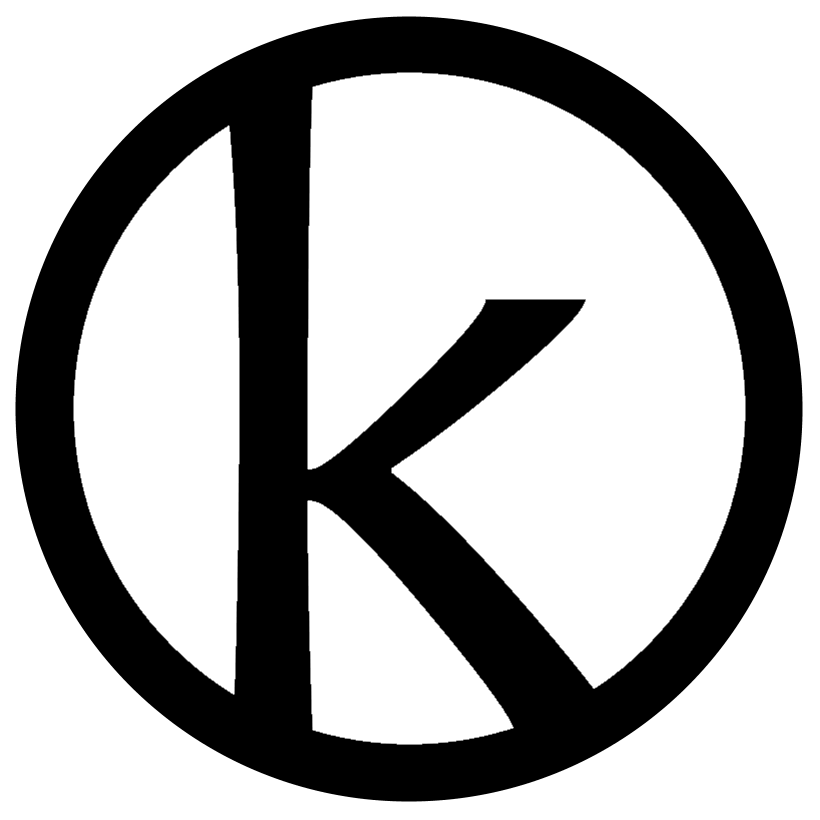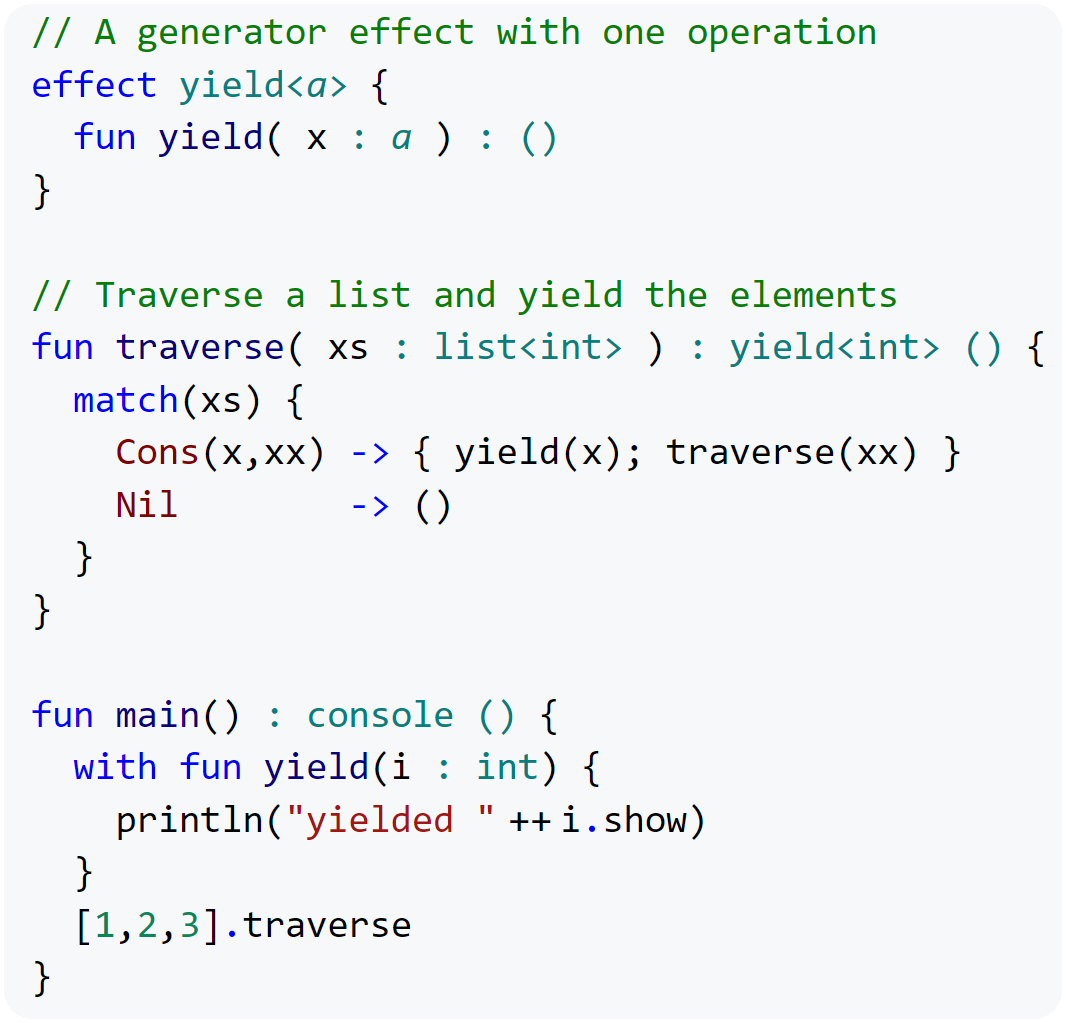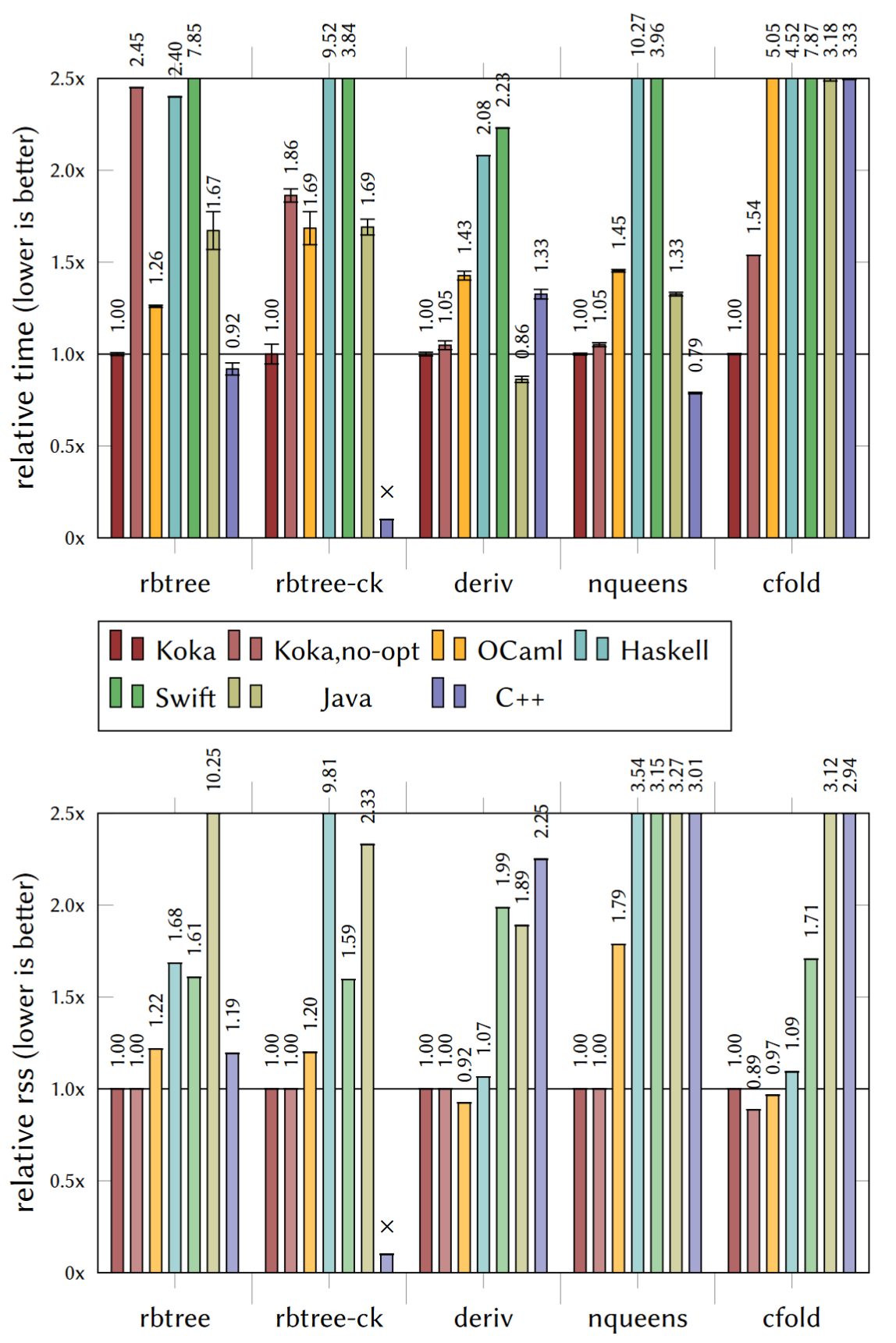Koka v2 is a research language that currently under heavy development with the new C backend
Latest release: v2.1.9, 2021-06-23 (Install).
Koka is a strongly typed functional-style language with effect types and handlers.
- The core of Koka consists of a small set of well-studied language features, like first-class functions, a polymorphic type- and effect system, algebraic data types, and effect handlers. Each of these is composable and avoid the addition of “special” extensions by being as general as possible.
- Koka tracks the (side) effects of every function in its type, where pure and effectful computations are distinguished. The precise effect typing gives Koka rock-solid semantics backed by well-studied category theory, which makes Koka particularly easy to reason about for both humans and compilers.
- Effect handlers let you define advanced control abstractions, like exceptions, async/await, or probabilistic programs, as a user library in a typed and composable way.
- Perceus is an advanced compilation method for reference counting. Together with evidence passing, this lets Koka compile directly to C code without needing a garbage collector or runtime system. Perceus also performs reuse analysis and optimizes functional-style programs to use in-place updates when possible.
To learn more:
- Install Koka and compile your first programs.
- Read the Koka book for a tour of the Koka language and its specification.
- Browse the library documentation.
- Help with development
Enjoy,
Daan Leijen
Special thanks to: Ningning Xie for her work on the theory and practice of evidence passing [9,6] and the formalization of Perceus reference counting [8], Alex Reinking for the implementation of the Perceus reference counting analysis [8], and all previous interns working on earlier versions of Koka: Daniel Hillerström, Jonathan Brachthäuser, Niki Vazou, Ross Tate, Edsko de Vries, and Dana Xu.
v2.1.9, 2021-06-23: initial support for cross-module specialization (by Steven Fontanella).v2.1.8, 2021-06-17: initial support for macOS M1 and Linux arm64, improved readline, minor fixes.v2.1.6, 2021-06-10: initial support for shallow resumptions, fix space leak with vectors, allowgccwith--fasan, improvedvcpkgsupport, add--fstdallocflag, improved VS code syntax highlighting, improvedvalgrindsupport, added--no-optimizeflag for extended debug information.v2.1.4, 2021-05-31: remove dependency on cmake, support library linking, support vckpg, updatedstd/text/regex, improved Windows installer withclanginstall included, remove dependency on Visual Studio on Windows, improved--fasansupport, fixed space leak on boxed value types, use signedsize_tinternally, various small bug fixes.v2.1.2, 2021-05-01: various bug fixes, allow pattern bindings in parameters of anonymous functions (by Steven Fontanella), initial Emacs syntax highlighting (by Kamoii).v2.1.1, 2021-03-08: bug fixes, use right-associative (++) for string- and list append (instead of (+)), improved internal string handling.- Older release notes.
Koka has binary installers for Windows (x64), macOS (x64, M1), and Linux (x64, arm64).
For other platforms, you need to build the compiler from source.
Koka has few dependencies and should build from source without problems on most common platforms, e.g. Windows (including WSL), macOS, and Unix. The following programs are required to build Koka:
- Stack to run the Haskell compiler.
Usecurl -sSL https://get.haskellstack.org/ | shon Unix and macOS, or the binary installer on Windows. - Optional: vcpkg to be able to link easily with C libraries. Koka can find it automatically if installed to
~/vcpkg. - Optional: nodejs if using the Javascript backend.
- Optional: On Windows it is recommended to install the clang C compiler, or the Visual Studio C compiler.
Now clone the repository and build the compiler as (note the --recursive flag):
$ git clone --recursive https://github.com/koka-lang/koka
$ cd koka
$ stack update
$ stack build
$ stack exec koka
You can also use stack build --fast to build a debug version of the compiler.
Use stack test --fast to run the test-suite.
(See the build notes below
for building on macOS M1, or if you have issues when running- or installing stack).
Koka can generate a binary install bundle that can be installed on the local machine:
$ stack exec koka -- util/bundle
...
distribution bundle created.
bundle : bundle/koka-v2.1.7-linux-x64.tar.gz
cc : gcc
version: v2.1.7
This takes a while as it pre-compiles the standard libraries in three build
variants (debug, drelease (release with debug info), and release).
After generating the bundle, you can install it locally as:
$ util/install.sh -b bundle/koka-v2.1.7-linux-x64.tar.gz
(use util/install.bat on Windows).
After installation, you can now directly invoke koka:
$ koka --version
Koka is by default installed for the current user in <prefix>/bin/koka,
(with architecture specific files under <prefix>/lib/koka/v2.x.x
and libraries and samples under <prefix>/share/koka/v2.x.x).
On Unix and macOS the default prefix is /usr/local while
on Windows the default prefix is %LOCALAPPDATA%\koka
These are initial benchmarks of Koka v2 with Perceus reference counting versus state-of-the-art memory reclamation implementations in various other languages. Since we compare across languages we need to interpret these results with care -- the results depend not only on memory reclamation but also on the different optimizations performed by each compiler and how well we can translate each benchmark to that particular language. We view these results therefore mostly as evidence that the current Koka implementation of reference counting is viable and can be competitive and not as a direct comparison of absolute performance between languages and systems.
As such, we select here only benchmarks that stress memory allocation, and we tried to select mature comparison systems that use a range of memory reclamation techniques and are considered best-in-class. The systems we compare are, Koka 2.0.3 (compiling the generated C code with gcc 9.3.0), OCaml 4.08.1, Haskell GHC 8.6.5, Swift 5.3, Java SE 15.0.1 with the Hotspot G1 collector, and C++ gcc 9.3.0.
The benchmarks are all available in test/bench (see the
readme there for build instructions), and all
stress memory allocation with little computation:
rbtree (inserts 42 million items into a red-black tree),
rbtree-ck (a variant of rbtree that keeps a list of every 5th
subtree and thus shares many subtrees), deriv
(the symbolic derivative of a large expression),
nqueens (calculates all solutions for the n-queens problem of size 13
into a list, and returns the length of that list where the solution lists
share many sub-solutions), and cfold (constant-folding over a large symbolic expression).
Note: in C++, without automatic memory management, many benchmarks are
difficult to express directly as they use persistent and
partially shared data structures. To implement these faithfully would
essentially require manual reference counting. Instead, we use C++ as
our performance baseline: we either use in-place updates
without supporting persistence (as in rbtree which uses std::map)
or we do not reclaim memory at all (as in deriv, nqueens, and cfold).
The execution times and peak working set averaged over 10 runs and normalized to Koka are in the figure on the right (on a 3.8Ghz AMD3600XT on Ubuntu 20.04, Nov 2020).
We can see that even though Koka has currently few optimizations besides the reference counting ones, it performs very well compared to these mature systems, often outperforming by a significant margin -- both in execution time and peak working set. Clearly, these benchmarks are allocation heavy but it is encouraging to see this initial performance from Koka.
A full discussion of these benchmarks and systems can be found in the Perceus report.
Please help develop Koka: there are many opportunities to improve Koka or do research with Koka. We need:
- Emacs (partially done) and Vim syntax highlighting.
- Improve documentation, landing page etc. Make it easier for people to contribute.
- More examples
- Many library modules are incomplete (like
std/os/file) or missing (likestd/data/map).
More advanced projects:
- Update the JavaScript backend to 1) use proper modules instead of amdefine, 2) use the new bigints instead of
bigint.js, and 3) add support for int64. This requires mostly changes to
Backend/JS/FromCore.hstogether withlib/core/core-inline.js. - Partially done: see PR #100. A language server for Visual Studio Code and Atom. Koka can already generate a typed range map so this should be managable.
- Package management of Koka modules.
- Proper overloading with (a form of) type classes. (in design phase).
Currently being worked on:
- Various standard optimizations like case-of-case, join points, case-of-known constructor, etc.
- Implement inline specialization where functions like
map,foldetc get specialized for the function with which they are called. This is an important optimization for functional style languages to reduce the allocation of lambda's. (contact: Steven Fontanella) - Borrowing analysis for Perceus and improved reuse analysis. (contact: Anton Lorenzen)
The following is the immediate todo list to be completed in the coming months:
- Port
std/async(usinglibuv). - Improve compilation of local state to use local variables directly (in C).
Contact me if you are interested in tackling some of these :-)
Recently completed tasks:
- Ported
std/text/regex(using PCRE) - Run the full test suite.
- Run the Bayesian probalistic machine learning program with large parameters.
- Functions with a pattern match in the argument (by Steven Fontanella).
The main development branches are:
master: latest stable version.dev: current development branch -- submit PR's to this branch.v1-master: last stable version of Koka v1: this is Koka with the Javascript (and C#) backend which does not use evidence translation. This version supportsstd/asyncand should compile examples from published papers.
Currently (Jun 2021) stack is not always working well on the M1.
You need to install ghc via brew:
$ brew install pkg-config ghc cabal-install haskell-stack
Moreover, sometimes stack segfaults and running it inside bash seems to resolve the issue:
$ bash
bash$ stack update
Also, we need to tell stack to use the system installed ghc and skip the version check:
bash:~$ git clone --recursive https://github.com/koka-lang/koka
bash:~$ cd koka
bash:~/koka$ stack --system-ghc --skip-ghc-check build
bash:~/koka$ stack --system-ghc --skip-ghc-check exec koka
and pass the --system-ghc flag to create an installation bundle as well:
bash:~/koka$ stack --system-ghc --skip-ghc-check exec koka -- util/bundle -- --system-ghc
Some platforms, like Linux arm64, do not
always support stack well. In these cases we can also
use ghc and cabal directly. Install these packages as:
$ sudo apt update
$ sudo apt install ghc cabal-install
On macOS (x64 and arm64) we use brew instead:
$ brew install pkg-config ghc cabal-install
Optionally, install vcpkg as well. If you
install this in the ~/vcpkg directory Koka will find
it automatically when needed:
~$ git clone https://github.com/microsoft/vcpkg
~$ ./vcpkg/bootstrap-vcpkg.sh
~$ vcpkg/vcpkg install pcre
We can now build the compiler using cabal as:
~$ git clone --recursive https://github.com/koka-lang/koka
~$ cd koka
~/koka$ cabal new-update
~/koka$ cabal new-build
~/koka$ cabal new-run koka
We can also run tests as:
~/koka$ cabal new-run koka-test
or create an installer:
~/koka$ cabal new-run koka -- util/bundle
If neither stack nor cabal are functional, you may try to
run the minimal build script to build Koka:
~/koka$ ./util/minbuild.sh
which directly invokes ghc to build the compiler.
You can create an install bundle from a minbuild as:
~/koka$ out/minbuild/koka util/bundle.kk -- --koka=out/minbuild/koka
The Koka compiler on Windows requires a C compiler. By default
when using stack exec koka the C compiler supplied with ghc is used (mingw)
but that is only visible within a stack environmet.
It is therefore recommended to install the clang compiler for
Windows (which is automatically installed when running util/install.bat).
However, Koka can also use the Microsoft Visual C++ compiler (cl) if you
run koka from a Visual Studio x64 toolset command prompt (in
order to link correctly with the Windows system libraries).
Generally, for Koka code, mingw (gcc) optimizes best, closely followed clang-cl.
On a 3.8Gz AMD 3600XT, with mingw 7.2.0, clang-cl 11.0.0, and cl 19.28 we get:
$ stack exec out\v2.0.5\mingw-release\test_bench_koka_rbtree -- --kktime
420000
info: elapsed: 0.624s, user: 0.625s, sys: 0.000s, rss: 163mb
$ out\v2.0.5\clang-cl-release\test_bench_koka_rbtree --kktime
420000
info: elapsed: 0.727s, user: 0.734s, sys: 0.000s, rss: 164mb
$ out\v2.0.5\cl-release\test_bench_koka_rbtree --kktime
420000
info: elapsed: 1.483s, user: 1.484s, sys: 0.000s, rss: 164mb
v2.0.16, 2021-02-14: bug fixes, fix short-circuit evaluation of logical operations, improved utf-8 handling.v2.0.14, 2020-12-11: bug fixes, improved var escape checking.v2.0.12, 2020-12-02: syntax highlighting support for VS Code and Atom, improved uninstall, more samples.v2.0.9, 2020-11-27: now with binary releases for Windows, macOS, and Linux.v2.0.7, 2020-11-23: more small fixes, improved scoped handlers, improved higher-rank type propagation, more samples.v2.0.5, 2020-11-15: many bug fixes and improvements. Improved codegen, named handlers, added samples, docker support, direct C compilation, local install support.v2.0.0, 2020-08-21: initial v2 release.
-
Daniel Hillerström, and Sam Lindley. “Liberating Effects with Rows and Handlers.” In Proceedings of the 1st International Workshop on Type-Driven Development, 15--27. TyDe 2016. Nara, Japan. 2016. doi:10.1145/2976022.2976033.
-
Daan Leijen. “Koka: Programming with Row Polymorphic Effect Types.” In Mathematically Structured Functional Programming 2014. EPTCS. Mar. 2014. arXiv:1406.2061.
-
Daan Leijen. Algebraic Effects for Functional Programming. MSR-TR-2016-29. Microsoft Research. Aug. 2016. https://www.microsoft.com/en-us/research/publication/algebraic-effects-for-functional-programming. Extended version of [4].
-
Daan Leijen. “Type Directed Compilation of Row-Typed Algebraic Effects.” In Proceedings of Principles of Programming Languages (POPL’17). Paris, France. Jan. 2017.
-
Nicolas Wu, Tom Schrijvers, and Ralf Hinze. “Effect Handlers in Scope.” In Proceedings of the 2014 ACM SIGPLAN Symposium on Haskell, 1--12. Haskell ’14. ACM, New York, NY, USA. 2014. doi:10.1145/2633357.2633358
-
Ningning Xie, Jonathan Brachthäuser, Daniel Hillerström, Philipp Schuster, Daan Leijen. “Effect Handlers, Evidently” The 25th ACM SIGPLAN International Conference on Functional Programming (ICFP), August 2020. doi:10.1145/3408981, pdf. See also [9] which improves upon this work.
-
Ningning Xie and Daan Leijen. “Effect Handlers in Haskell, Evidently” The 13th ACM SIGPLAN International Haskell Symposium, August 2020. pdf See also the Ev.Eff and Mp.Eff repositories.
-
Alex Reinking, Ningning Xie, Leonardo de Moura, and Daan Leijen: “ Perceus: Garbage Free Reference Counting with Reuse” MSR-TR-2020-42, Nov 22, 2020. Distinguished paper at PLDI'21. pdf
-
Ningning Xie and Daan Leijen: “ Generalized Evidence Passing for Effect Handlers” MSR-TR-2021-5, Mar, 2021. pdf


